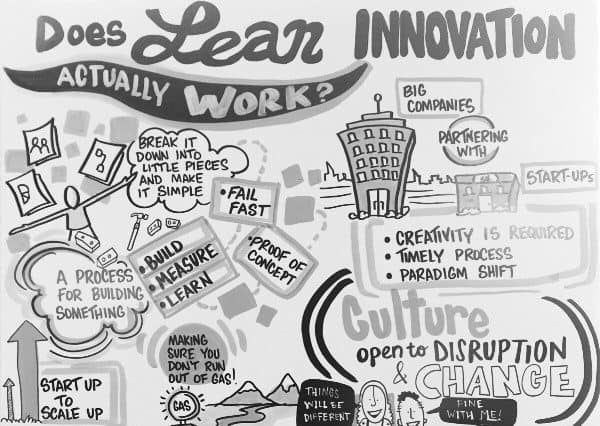An Afternoon on Corporate Lean Innovation: 3 Key Takeaways

Ben Yoskovitz, Founding Partner of Highline BETA, spoke on last week’s Elevate Lean Innovation Panel at Elevate Toronto. The conviction across the panel was clear that intrapreneurship and co-creation is the answer to how big companies can successfully innovate.
Disruptive competitors and nimble startups are changing industry landscapes at unprecedented rates. Legacy corporations cannot continue business-as-usual practices if they want to remain on top. The solution? If you can’t beat them, join them. Ben, along with Sheetal Jaitly (CEO, TribalScale) and Maithili Mavinkurve (Co-Founder/COO, Sightline Innovation) spoke to an audience of representatives from established enterprises to explain how they can make Lean Innovation the answer, not the enemy. Here are the main takeaways from the afternoon.
What is Lean Innovation?
Lean Startup Methodology is a user-focused, scientific approach to creating a new venture that gets products into customers’ hands while wasting as few resources as possible. Mai described lean startup methodology as if you’re driving a car and only have a certain amount of gas in the tank. “How do you get from point A to point B as efficiently as possible without running out? In other words, how do I get my product realized and to market while wasting as few resources as possible.”
Ben explained, “you want to fail and you want to fail fast to reduce wasted time, wasted resources and wasted money. You’d be surprised how rarely large companies actually talk to their customers to figure out what they want. You have to build empathy for your customers.” Times have changed from the days of building out complete business plans and launching them prior to consumer feedback. The truth is, we rarely know what customers want. Too often millions of dollars and hundreds of hours are spent building products that no one wants. Lean Startup Methodology changes that. Its scientific approach consists of a three step cycle: build, measure, learn. The goal is to repeat this cycle over and over and to do it quickly. You want to test, fail and fail fast, not wasting time seeing if things will fail or succeed in the long run.
How do corporates keep winning?
Legacy corporations are successful for a reason. But their reign is far from guaranteed. “I have so much respect for big corporations because at some point, they won and they won big, bigger than any of us ever have. They didn’t get big magically,” said Ben. “My job is to answer their next question: how do we keep winning?” His answer to this, along with the rest of the panel, is by incorporating lean startup thinking into their businesses.
The current state of disruption by startups is far from doom and gloom for corporations. This wave of innovation can be used to the advantage of corporates if harnessed properly. Established businesses are shifting focus and adopting Lean Practices to not only keep up, but to further establish themselves as industry leaders.
By integrating Lean Methodologies into dedicated business units, internal ventures can be created that may even be separate from the core business model. “That’s when things get really interesting. If you can innovate on the core business model or create a new one, that’s when significant innovation takes place,” said Ben. Sure, this may cause waves throughout the organization and may even cannibalize a small portion of the original business, but “wouldn’t you want to be disrupted by yourself rather than the competition?” questioned Mai.
Thinking like a startup and working closely with startups are also strategic ways of monitoring the playing field. Large companies should have an interest in what startups are doing so they can keep their finger on the pulse of the competitive landscape, and the same is true in reverse for startups. When startups work intimately with corporates, they gain the advantage of knowledge that can only be accessed by companies of scale. “It’s mutually beneficial,” said Mai. “If you can build a sandbox environment where ideas can flow, you can kick the tires to get Lean Methodology working for your corporation while startups get access to a large user base.” Still, partnering with a startup isn’t a silver bullet for either group. To really make it successful, you have to find the people who understand both worlds to bridge the gap.
How do you foster the Lean Startup Methodology within a large corporation?
Change is rarely easy, especially when core business practices and a legacy culture have been comfortable paths to success for decades. In order to encourage a new way of thinking, you have to find the right people and give them the resources they need to succeed.
“I believe that entrepreneurial people exist in large corporations. If you give them the right space, resources and performance metrics they need, they can create real change,” shared Ben. Mai similarly said that in order to provoke an entrepreneurial shift in culture, you have to “give people the space to say crazy things, to come up with crazy ideas. You have to let people try things and fail.” If not they’ll always play it safe with the status quo.
“It’s not enough to have a shiny room with white desks and laptops you can call an innovation lab to check-off on your shareholders’ wish lists” added Sheetal. To create real change, you have to walk-the-walk of Lean Innovation. With the proper processes and reward structures that allow people to take the necessary risks, you can enable intrapreneurs who can not only disrupt your business or add new business lines, but can champion and spread the same entrepreneurial spirit company-wide.
© 2020 Highline BETA Inc. All Rights Reserved.
Privacy Policy · Terms & Conditions